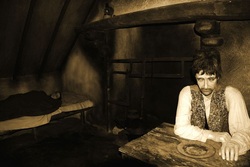 The sad misery of the Great Famine The sad misery of the Great Famine As we approach St. Patrick's Day we are aware of the fact that this day is celebrated all over the world mainly because there are so many people or Irish descent worldwide. Many of their Irish born ancestors left Ireland during the Great Famine of the mid 19th century. In Donegal alone the population decreased by 41,000 between the Census of 1841 and the Census of 1851. Of those 41,000 some were lucky enough to have died naturally but many more died of starvation and the balance emigrated to countries such as America, Canada and Britain. 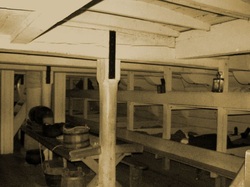 Inside a 'Famine Ship' Inside a 'Famine Ship' Those that were "lucky" enough to escape the Famine. leaving behind loved ones they knew they would never again see, travelled in dire conditions on ships nicknamed "coffin ships" in reference to the fact that around one third of those travelling died before they ever reached distant shores and the hope of a new life. The conditions were extremely cramped on board these ships with a whole family having to sleep in a space about the size of a small double bed surrounded on both sides by other families only divided from them by a piece of wood. The journey took around six weeks and the owners of the ships supplied as little food as possible. So with the cramped conditions and lack of food came disease. Those that died on board were thrown overboard to a watery grave. The song "The Emigrants Daughter" is about a young girl who died on board one such ship: "Oh please ne'er forget me though waves now lie o'er me I was once young and pretty and my spirit ran free But destiny tore me from country and loved ones And from the new land I was never to see. A poor emigrant's daughter too frightened to know I was leaving forever the land of my soul Amid struggle and fear my parents did pray To place courage to leave o'er the longing to stay. They spoke of a new land far away 'cross the sea And of peace and good fortune for my brothers and me So we parted from townland with much weeping and pain Kissed the loved ones and the friends we would ne'er see again. The vessel was crowded with disquieted folk The escape from past hardship sustaining their hope But as the last glimpse of Ireland faded into the mist Each one fought back tears and felt strangely alone. The seas roared in anger, making desperate our plight And a fever came o'er me that worsened next night Then delirium possessed me and clouded my mind And I for a moment saw that land left behind. I could hear in the distance my dear mother's wailing And the prayers of three brothers that I'd see no more And I felt father's tears as he begged for forgiveness For seeking a new life on the still distant shore. Oh please ne'er forget me though waves now lie o'er me I was once young and pretty and my spirit ran free But destiny tore me from country and loved ones And from the new land I was never to see." 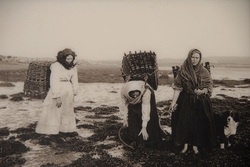 Gathering seaweed during The Famine Gathering seaweed during The Famine For those who couldn't escape to new lands life was very hard. Lack of food and seeing their children and families dying of starvation and saying goodbye forever to those they loved who set off for the coffin ships to try for a new life. People ate anything they could get their hands on to try to survive another day. Although Donegal has over 700 miles of shoreline, many of the foreshores were owned by landlords who would not allow the starving people to fish from these shorelines. The photo on the left shows women of the Fanad peninsula in Donegal gathering seaweed to feed their families during the famine so at least they were allowed to gather that. The extreme lack of food forced people to find what they could to eat anywhere and often at extreme danger to themselves. 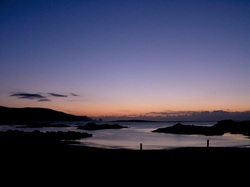 Rossbeg, County Donegal Rossbeg, County Donegal One such example from Donegal is of the man who made his way over a rocky shoreline to a large rock where seagulls nested in the hope he could gather their eggs to feed his starving children. The rock is off the coast of Rossbeg in west Donegal. A few years ago we were there taking photographs of this very scenic place when we met a man who told us the story. In the photos below you will see more clearly the hard journey the man made to get a few eggs. It is a rocky headland and the large rock he travelled to would be difficult to reach even for a fully fed, healthy man. He was weak and hungry but such was his will to save his family he made the journey. Sadly he died of exhaustion on the rock and even though men from the local village attempted to take his body home to bury, their weak state from starvation rendered this impossible. So his body had to be left on the rock, something his family must have been even more saddened about as they never had a burial plot nor grave to visit.
2 Comments
2/3/2018 01:15:02 pm
Thanks you Iam doing an tour guide course in killybegs Co Donegal so all these stories will be told again . Will gave you a mention Thanking You Cathal Mc Hugh
Reply
Julie
2/11/2020 10:18:49 pm
Thank you for preserving these stories. Heartbreaking - they really touch your soul. 💙
Reply
Your comment will be posted after it is approved.
Leave a Reply. |
We Love DonegalWe Love Donegal is a site dedicated to bring the beauty of County Donegal on the north west coast of Ireland to the world. Categories
All
|

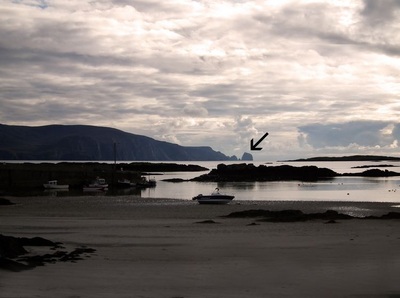
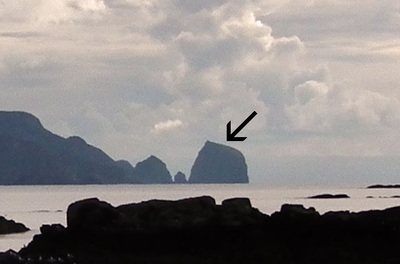
 RSS Feed
RSS Feed